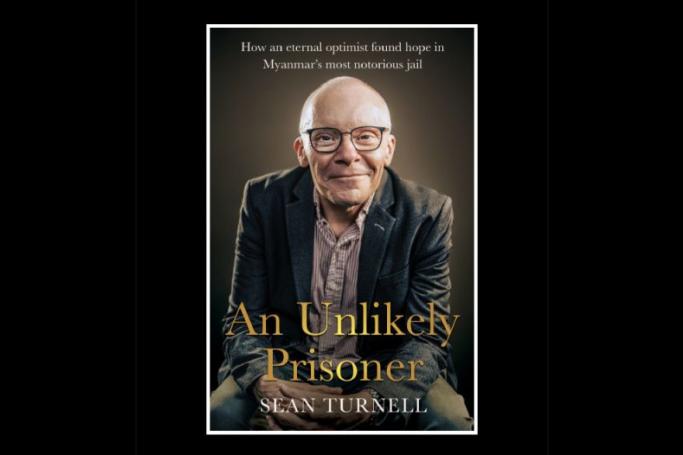Mizzima
An unlikely prisoner, indeed. Sean Turnell is the epitome of a chipper Aussie mate with a zest for life. But, as anybody following the twists and turns of Myanmar’s post-coup crisis knows too well, the well-read Australian economist ended up swatting blood-thirsty mosquitoes in the country’s notorious Insein Prison, accused, incredibly, of being a spy.
“An Unlikely Prisoner: How an eternal optimist found hope in Myanmar’s most notorious jail” by Sean Turnell is an engaging book soon to be released offering the full story of Turnell’s arrest, 650-days imprisonment, and eventual release after the Australian government, and many supporters around the world, called for an end to the absurdity.
As the book suggests, in his darkest hour hope became his closest companion.
Turnell has made it his life’s work to specialize in Myanmar and to throw his scholarly might behind helping Myanmar rise from decades of economic mismanagement – a result of military rule that placed Myanmar behind all of its Southeast Asian neighbours. In 2009, the Nordic Institute of Asian Studies published his book on key periods in the history of Myanmar's financial sector, “Fiery Dragons: Banks, Moneylenders and Microfinance in Burma”.
The shock of the Myanmar military coup on 1 February 2021 caught most people off guard, not least Turnell who was in Yangon at the time – the wrong place at the wrong time.
It was the Australian economist’s work as an economic advisor to Aung San Suu Kyi’s National League for Democracy-led government that arguably sealed his fate, as the hours and days ticked by after the 1 February coup.
Granted, it would not have been easy to grab a bag and immediately head to Yangon International Airport to try to leave. The generals in Naypyidaw would have thought this through, recognizing a foreign advisor to The Lady could prove a useful pawn in their game to discredit the popular leader. Little surprise, then, that on 6 February 2021, Myanmar junta officials came knocking on his door and arrested him.
Turnell became the first foreign national known to be arrested in relation to the coup. Within a few days, the Australian government called for his immediate release.
Myanmar analysts, observers, and Turnell’s friends were shocked by the turn of events. But it soon became clear, given allegations of breaking the Official Secrets Act and being a spy – allegations that Turnell naturally denied – that the advisor to Suu Kyi would be useful in the military junta’s game to imprison the civilian leader for life and put an end to their now “out of control” democratic experiment they had unleashed starting with the bedrock of the military-written 2008 Constitution.
Turnell’s book “An Unlikely Prisoner” delves into the shock and feelings of an innocent man thrown into Myanmar’s notorious prison system – a legacy of British colonial rule.
Turnell told the Australian newspaper that he was initially kept at Yangon's Insein prison in a six metre by 2.5 metre concrete cell in which an iron chair with leg irons had been bolted to the floor. He then endured two months of interrogations, sometimes being taken from his bed to be locked in the irons.
Officials accused him of working for British intelligence and gun-running, and quizzed him about his work for Suu Kyi, the economist was quoted as saying, noting that he had been infected with COVID-19 five times and kept in solitary confinement for months.
In the early days of his confinement, Turnell said he could hear the sounds of people outside banging pots and pans at night in protest against the military coup.
"Then came the explosions and gunfire and people being tortured in rooms nearby. I thought, they're not going to do that to me surely? Then after a while, I started thinking, maybe they will. I think they wanted me to hear it."
Turnell told the Australian newspaper that he had expected to be treated "with kid gloves".
"They didn't stick electrodes to me, but I was thrown into filthy cells. The food they used to deliver to me (came) in a bucket. For 650 days, I ate out of a bucket."
In the Naypyidaw detention centre, to which he was later transferred, "it wasn't even a new bucket, they were paint buckets", he said. "They didn't beat me, but they did push and shove me."
There prisoners were locked away for 20 hours a day, and he found communication of sorts which help bolster his sense of hope.
"In the monsoon, the roof would leak and we would sit there all night sometimes with water just pouring down through the roof, clutching your clothes and blanket to try to keep them dry," he said.
Turnell said his wife, Ha Vu, an economist at Australia's Macquarie University, helped him survive with phone chats and by regularly sending books, cookies and cake through the Australian embassy. There are reportedly indications that the military junta were surprised by the level of outside support for him.
The economist was sentenced in September 2022 to three years' imprisonment for breaching Myanmar's Official Secrets Act - charges he denied - before being released on 17 November 2022 in an amnesty along with former British ambassador Vicky Bowman and Japanese journalist Toru Kubota.
Turnell endured 650 days of imprisonment in appalling conditions.
Turnell currently lives in Sydney with his wife who campaigned tirelessly for his release. He has dedicated his book to all those unjustly incarcerated by the military junta in Myanmar, including Aung San Suu Kyi, 78, whose health is reportedly failing as she faces 27 years in jail, effectively a life sentence.
The book promotion contains the following comments of support:
“Australia’s most unlikely political prisoner . . . is known as a person of deep optimism, bubbling enthusiasm and infectious warmth,” says Melissa Crouch, Sydney Morning Herald.
“What [Sean Turnell] endured in his 650 days of incarceration is something that no human being should have to endure, yet he has done it with grace and, even in inhumane conditions, with profound humanity,” says Australian Prime Minister Anthony Albanese.
The book can be found at Penguin.com available for pre-order:
https://www.penguin.com.au/books/an-unlikely-prisoner-9781761342929
Reporting: Mizzima, AFP, The Australian












